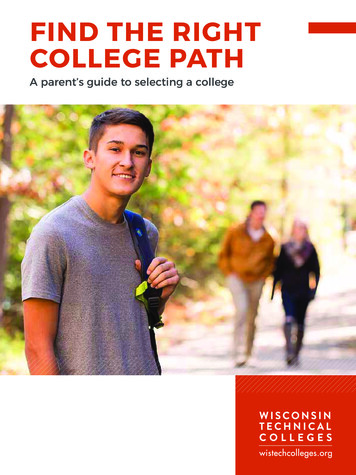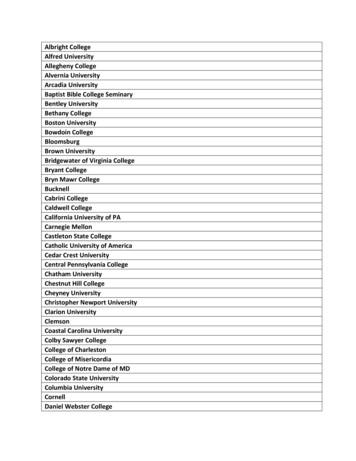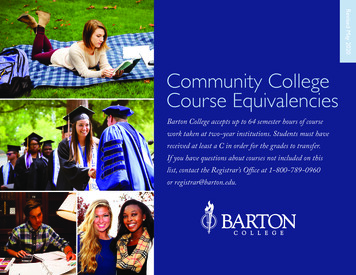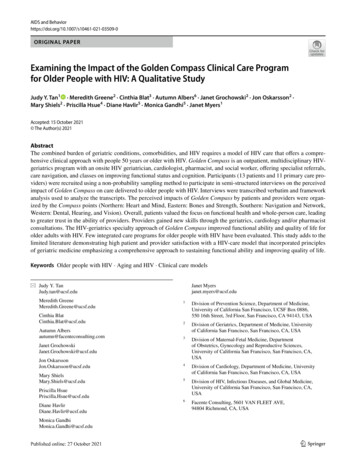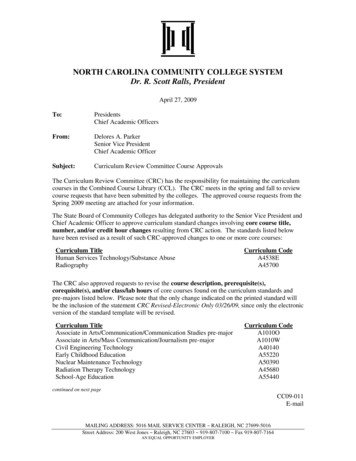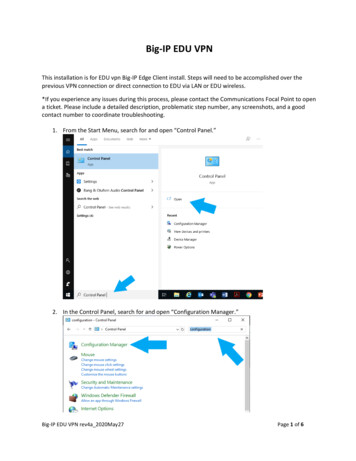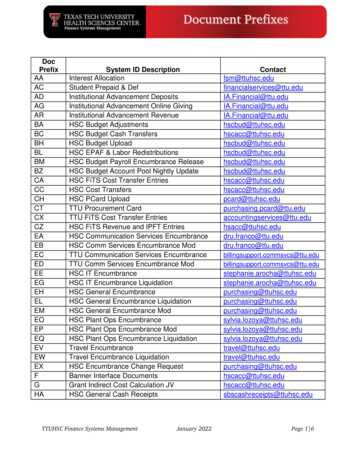
Transcription
tmentofNursingRoom 0159000BabcockBoulevardPittsburgh,PA15237
2FORWARDWelcome to the Nursing Program at La Roche College!The purpose of this Student Handbook is to acquaint you with thepolicies and procedures of the Master of Science in NursingProgram.You are advised to refer to the College Catalog and the CollegePolicies and Procedures online at http://intranet.laroche.edu assupplemental resource materials. In addition, it is stronglyrecommended that you contact your advisor on a regular basisduring your progression through the nursing program.The nursing faculty and staff wish you much success in youreducational endeavors!DisclaimerThis publication is not to be viewed as an irrevocable contract betweenthe College and the student and is subject to change consistent withpolicies of the Board of Trustees. The College reserves the right torepeal, change, amend, modify, add, and withdraw the contents hereinwithout notice or obligation.Revised:Fall 1994Fall 1995Fall 1996Fall 1997Fall 1998Spring 2000Summer 2003Summer 2004Fall 2011Spring 2012Fall 2012January 2013September 2013September 2014La Roche College Nursing Department
3Dear MSN Student,I am pleased to welcome you to La Roche College as a graduatestudent in our Master’s degree program. Faculty are excited to haveyou enter our program, and look forward to becoming your teachersand mentors. The educational experiences in the MSN Program arebuilt on the experiences of your BSN Program. You will notice somesimilarities and many differences in your educational experiences at LaRoche College. As an adult learner, you are expected to be an activeparticipant in the teaching-learning process.The curriculum for this program has been carefully designed to fosterdevelopment of communication skills, further develop and incorporateleadership skills, utilize research and evidence based practice andintegrate advanced theoretical knowledge into your role as a NurseAdministrator or Nurse Educator. We are confident that you will enjoyyour educational program. The years ahead will be challenging butwith organization and steady application of your talents and abilities,you will find them beneficial and rewarding.The nursing program provides the academic rigor for graduateeducation, and the online courses offer the scheduling flexibilityneeded by the adult student with career and family responsibilities.Faculty will challenge, encourage and support you through thiseducational process.I wish you the very best as you begin this next phase of youreducation!Sincerely,Terri L. Liberto, PhD, RNChair, Department of Nursing
4ContentsPageSelected General College InformationNon-Discrimination PolicyMy.LaRoche.eduStudent HandbookLa Roche College WebsiteSupport ServicesThe Writer’s CenterLibraryResidency RequirementsTranscriptsFamily and Educational CodeCopyright LawsKerr Fitness and Sports CenterOffice of the Registrar678888999910101011Selected La Roche College PoliciesRegistration PolicyAdd/DropCourse WithdrawalsGrading System PolicyIncomplete Grade PolicyAcademic Probation PolicyGrade Appeal Policy and Procedure1212131314141515Department of Nursing General InformationPhilosophy of the Department of NursingOrganizational FrameworkHistoryAccreditationMother Marie de La Roche Award in NursingScholarshipsSigma Theta TauAcademic IntegrityFrequently Used Telephone Numbers/Emails17182021212122222223Department of Nursing General Policies100.3 Statute of Limitations Policy100.4 Grading Policy100.6 Minimum Credit Requirement Policy100.7 Plagiarism Policy100.8 APA Policy242526272728
5PageMSN Program General Information and PoliciesMSN Program OutcomesChain of Communication MSNProgram Guide Nursing AdministrationProgram Guide Nursing Education400.1 MSN Admission Requirements Policy400.2 Transfer of Credit for Students in the GraduateNursing Program Policy400.3 Provisional Status of Students in the GraduateNursing Program Policy400.4 MSN Admission Requirements for InternationalStudents Policy400.5 RN to MSN Program Policy400.6 Readmission Policy400.7A MSN Grading Policy400.7B Progression and Retention in the MSNProgram Policy400.8 Grade Appeal Policy—MSN401.1 MSN Program Health and Safety Requirements Policy402.2 Student Professional Liability Insurance Policy403.0 MSN Portfolio Requirement403.1 Graduation Requirements Policy-MSN293031323334353637383940414243495051
6SelectedGeneral College InformationNote: Further information on all College policies can be accessed athttp://intranet.laroche.edu, Resources, Policies and Procedures.
7Non-Discrimination PolicyLa Roche College admits qualified students of any sex, race, color, handicap, religion, nationaland ethnic origin, veteran status and sexual orientation to all the rights, privileges, programs andactivities generally accorded or made available to students at the college. It does not discriminatein the administration of its educational programs, admissions policies and processes,employment practices, scholarship and loan programs, athletic and other college-administeredprograms.La Roche College's non-discrimination policy is administered in accordance with title IX of the1972 Educational Amendments, and all other applicable federal and Pennsylvania statutes.The college is committed to serving a diversity of students by providing educational and extracurricular programs which will enhance their overall educational experience. The college iscommitted also to maintaining a humane atmosphere in which all individuals and groups arerespected and not disparaged.The college is unalterably opposed to any form of harassment. Harassment includes behavior,speech, or writing that demeans or stereotypes individuals in a harmful way. Harassment maycreate an intimidating, hostile, or demeaning environment and often has the effect of interferingwith an individual's full and free participation in the life of the college.ImplementationAny person(s) who believes that discrimination or harassment of students has occurred or isoccurring in violation of this policy, should report such incidence to the dean of students. Incases involving other students, the Student Code of Conduct has official jurisdiction over suchallegations for which disciplinary action may be taken. In cases involving faculty or staff, thevice president for student life refers the complaint to the vice president of academic affairs or thedirector of human resources, respectively, for action in compliance with college policy. Suchaction may include the use of informal resolution procedures and/or the Student GrievanceProcedure.NotificationThe Non-discrimination Harassment Policy is published in the Student Handbook and appears atleast one time during the academic year in the student newspaper. Employees are notifiedthrough a letter from the Human Resources Office.
8My.LaRoche.eduMyLaRoche is an online system for registration. Students are able to access this through theCollege website. Students are given a user ID and password to gain access to this system. Theseuser ID and passwords are different than those used for access to the general email system.Students use MyLaRoche to look up course schedules, register for classes, to obtain midterm andfinal grades and to obtain unofficial copies of their academic transcript.Student HandbookThe La Roche College Student Handbook is located online at http://www.laroche.edu/handbook .This handbook contains a wealth of information including student policies and procedures.La Roche College WebsiteStudents are encouraged to become familiar with the La Roche College website,http://intranet.laroche.edu. This site has much valuable information and can save time and effortby supplying answers to common questions. Important dates related to the academic calendarcan be found on this site as well as current activities occurring on campus.Support Services:Student Academic Support Services [SASS], http://www.laroche.edu/sass/home.htmMarie Deem, M.A., Associate Dean of Academic Affairs for Student Academic Support ServicesMarie.Deem@laroche.edu, 412-536-1128Student Academic Support Services includes the offices of Academic Advising, CareerDevelopment, Disability Services, and Academic Counseling and Tutoring. The primary missionof SASS is to help students become active, independent and confident learners.Through focused efforts in Academic Advising, Career Development, Academic Counseling andTutoring, and Disability Services, students are exposed to and guided through the myriad ofresources available to them to assist in their quest for college and career success.In addition to providing direct services to students, the Student Academic Support Services teamis also available to La Roche College’s faculty, staff and administrators to work together onstudent referrals, retention initiatives, and other learning support programs.
9The Writers’ CenterThe Writers’ Center is located in Academic Building 209, 412-536-1230. This Center isavailable to all students. The Center can help students develop ideas, structure their writing andwrite clear and effectively.LibraryThe John J. Wright Library and Learning Center houses a variety of services. Students mayborrow up to 10 books by presenting their student ID card with current validation sticker.Students may also use the library at UPMC Passavant Hospital during business hours Mondaythrough Friday. Students can submit a request for library material from UPMC Passavant andother libraries using the intra-library loan procedures. Please contact the librarians for additionalinformation about this process. For additional information about the library including hours ofoperation, please access http://intranet.laroche.edu Resources Wright Library.Residency RequirementsThe last 30 credits must be taken at La Roche College. Students who wish to test out of a coursemust do so prior to beginning their last 30 credits.TranscriptsAn official copy of your final transcript will be mailed to you along with your diploma. Yourfinal transcript will include your degree and conferral date, along with your major, minor, andany certificate earned.If you submit a transcript request for employment purposes, certification application, oradmission to graduate school, make sure to indicate “hold until the degree is posted.” You canorder transcripts and track the status of your order online through www.getmytranscript.com.
10Family and Educational CodeLa Roche College respects the rights of all students as individuals within the college community.The college fully complies with the Family Educational Rights and Privacy Act of 1974(FERPA, also known as the "Buckley Amendment"). FERPA is a federal law which states thatan institution must maintain the confidentiality of student education records. In addition, the lawstates that (a) a written institutional policy must be established and that (b) a statement ofadopted procedures covering the privacy rights of students must be made available. A summaryof the final FERPA regulations which include 1993 amendments may be obtained by requestfrom the registrar's office.The law provides for: inspection of records by a student; the opportunity for a hearing for a studentto challenge the content of a record; the permission of the student for release of the record andmaintenance of a record of all persons, including the student, who inspects the file.Student records, both academic and personal, are confidential records. With the exception ofdirectory information, records may be released only with the student's written permission.For further information concerning the release of nursing student records, please contact theRegistrar or the Department Chair.Copyright LawsThe copyright law of the United States governs the making of photocopies. Students mayreproduce one copy of an article from a periodical, newspaper or book, for no other purpose thanpersonal study or research.The library has two coin-operated photocopy machines which students may use. The cost is ten(10) cents per copy. Photocopies of microforms (microfilm or microfiche) of newspapers orperiodicals may be obtained in the microform area. The same charge of ten (10) cents per copy isassessed. A coin change machine is also located on the upper level of the library. The copyrightlaw of the United States governs the making of photocopies.Kerr Fitness and Sports CenterThis Center, completed in 1993, houses a gymnasium, racquetball courts, indoor track, aerobicsand weight room. Nursing students may use these facilities by presenting their student ID cardduring normal operation hours. Students are encouraged to call 412-536-1001 or 412-536-1007to check hours of operation.
11Office of the RegistrarThe Registrar’s Office supports the academic mission of the College by facilitating the transitionof students from matriculation to degree completion, interpreting and enforcing academicpolicies and procedures, maintaining and ensuring the integrity of all academic records, adheringto federal regulations pertaining to the governance of students’ academic records, and providingaccessible, reliable, responsive and courteous personal and technological services that meet thediverse needs of our students, faculty, administration and outside customers. Students can accessthe Registrar Office online https://intranet.laroche.edu Offices Registrar.
12SELECTED LA ROCHE COLLEGE POLICIESRegistrationRegistration for all continuing* La Roche College students is through a web-based registrationsystem known as My.LaRoche.edu. My.LaRoche.edu permits students access to: the course schedule for the registration session, including a listing of closed courseson-line registration and course add and/or dropthe student's current schedule and gradesa degree audit which calculates the courses the student has completed and needs tocomplete to meet degree requirementsan email link to his/her advisora GPA projection link that allows the student to do a "what if?" scenariothe student's unofficial academic recordthe student's biographical information on file at the college* A continuing student is one who was registered at La Roche within the last calendar year.** A new student is one who is registering at La Roche for the first time.NOTE: You must have a La Roche College network account in order to access onlineregistration and student information.Registration PolicyStudents are permitted to attend only those classes for which they are registered. Credits are notgranted nor grades recorded on a transcript for any course for which a student has not beenofficially registered. Students with outstanding balances are not permitted to register.Many upper-division courses have pre-requisites as listed in the Course Catalog. Students maynot register for courses until they have met the pre-requisites or unless the division chair ordepartment chair grants permission in writing.Registration/Late RegistrationRegistration for continuing students begins during the advising period and ends on theestablished registration deadline for the semester, as published in the online AcademicCalendar. During this period, students register online through My.LaRoche.eduAfter the registration deadline, and until the last day of add/drop, continuing students who havenot yet registered must complete the financial clearance process before registering. A 100 lateregistration fee is assessed at this time. Tuition, all fees, and any prior balance must be paidbefore the registration can be processed. The Financial Clearance Form is available online onthe Registrar's web site under "Student Forms" and can be submitted electronically.
13Registration for new students begins immediately after the advising period for continuingstudents and ends on the last day of add/drop for the semester. New students are registered byGraduate Studies and Adult Education (transfer and graduate students) or Student AcademicSupport Services (freshmen).Requests for Registration after the end of the add/drop period may be submitted to the Registrar,and will be considered only under extenuating circumstances with the approval the AcademicDean. Contact the Registrar at registrar@laroche.edu for more information.Add/DropThe Add/Drop period for the Fall and Spring semesters and sessions is one week inlength. During this time, students add and drop courses online throughMy.LaRoche.edu. Permission of the instructor is required to add an online class after the firstday of the semester or to add an accelerated course after the first class meeting. Instructorpermission may be obtained via La Roche email and forwarded to the Registrar's Office. Tuitioncharges are removed for all courses dropped within the first week of the semester.Course Withdrawal with W GradeStudents can withdraw from courses through the eleventh class day of the Fall and SpringSemesters with a 50% reduction in tuition charges. W grades are assigned during thisperiod. The Course Withdrawal form is available online on the Registrar's web site.Course Withdrawal with F GradeAfter the deadline for withdrawal with a W grade, a student can withdraw with an automatic Fgrade through the end of the semester or session.Accelerated Fall/Spring and Summer Session Add/Drop and Withdrawal DatesStudents can withdraw from an eight-week accelerated course through Friday of the fifth week ofthe session. The add/drop, withdrawal, and refund periods for the abbreviated summer sessionsare based on the length of each session and number of class meetings, and students shouldconsult the online academic calendar on the Registrar's web site for specific deadlinedates. Students can add, drop and withdraw online through My.LaRoche.edu.Publication of Deadline DatesAll registration, add/drop, and withdrawal dates are published in the online Academic Calendarspublished on the Registrar's web site. Students are responsible for knowing and meeting allregistration deadline dates.
14Withdrawal or Leave of Absence from the CollegeStudents who intend to leave the college temporarily (Leave of Absence) or permanently(College Withdrawal) must complete the online College Withdrawal/Leave of Absence formlocated under "Student Forms" on the Registrar's web site. Upon submission of this form,withdrawing students are directed to an online Exit Interview.Grading System PolicyThe college awards the following grades and assigns quality points on a 4-point scale:GRADESAAB BBC CCD DDFQUALITY 00.700Incomplete Grade PolicyIn exceptional cases, a student may request an incomplete grade ("X") for a course. If approvedby the instructor, the request for an incomplete will be submitted on the appropriate form to theRegistrar's Office by the last day of the examination period of the semester in which the studentis registered for the course.In the event that the student does not complete the necessary work within six (6) weeks after thebeginning of the next academic semester, the "X" grade will automatically become an "F" grade.Extension beyond six (6) weeks may be granted only by the Vice President for AcademicAffairs.
15Academic Probation PolicyFull-time students whose cumulative quality point averages are below 2.0 (1.80 for freshmen) orwho are subject to a second placement on academic warning may be placed on academicprobation for their subsequent fall or spring semester of enrollment.Any student placed on academic probation is required to work with a designated academicsupport adviser on strategies to enhance his/her academic performance. Any student placed onprobation may be restricted to no more than 13 credits for his or her subsequent fall or springsemester of enrollment, and may be subject to other conditions as required by the academicsupport adviser or the Academic Standing Review Board.Grade Appeal Policy and ProcedureStudents may seek review of a grade through a formal grade appeals process. A grade will bereviewed by the grade appeals committee on the basis of whether the grading procedure waseffectively communicated to students at the beginning of the semester, and to determine whetherthe communicated grading procedure was followed.To make such a determination, faculty may be asked by the grade appeal review committee to: Explain the basis or criteria for a grade Demonstrate that the basis or criteria was communicated at the beginning of the semester, and Demonstrate that the grading procedure was not indiscriminately applied.The methodology faculty may use in teaching or grading will not be reviewed in the formalgrade appeal process.In the appeal proceedings, the burden of proof is on the student appellant to prove that a changeof grade is the appropriate course of action in his or her case. Students may not use the gradeappeal process to challenge college policy.For the purpose of undergraduate student grade appeals, the grade appeal review committeecomprises: Three faculty members, plus two alternates named by the Associate Vice President forAcademic Affairs and Dean of Graduate Studies and Adult Education. A representative from the Administration named by the Associate Vice President for AcademicAffairs and Dean of Graduate Studies and Adult Education; The Vice President of the Student Government Association; One undergraduate student (plus one alternate) elected by the Student Government AssociationFor the purpose of graduate student grade appeals, the committee comprises: Three faculty members, plus two alternates named by the Associate Vice President forAcademic Affairs and Dean of Graduate Studies and Adult Education; at least one votingmember must have regularly taught in one of the graduate programs
16 A representative from the Administration named by the Associate Vice President for AcademicAffairs and Dean of Graduate Studies and Adult Education; Two graduate students. A pool of six graduate students will be selected by the Associate VicePresident for Academic Affairs and Dean of Graduate Studies and Adult Education. Student andfaculty alternately excuse two students each with the remaining two students serving on thecommittee.
17Department of NursingGeneral Information
18Philosophy of the Department of NursingThe philosophy of the Department of Nursing is derived from and is consistent with the mission,objectives, and values of the College. The Department philosophy focuses on faculty beliefs aboutthe person, environment, health, nursing, and education. The faculty supports the American NursesAssociation (ANA) definition of nursing. "Nursing is the protection, promotion, and optimization ofhealth and abilities, prevention of illness and injury, alleviation of suffering through the diagnosisand treatment of human response, and advocacy in the care of individuals, families, communities,and populations."Each person is a unique integration of physiological, psychological, social-cultural, developmental,and spiritual dimensions in continuous interaction with the environment. Each person has the rightto respect, dignity, and self-determination. The person, as an individual, and as a member of afamily, group, local or global community, is the central focus of nursing.The environment includes socio-cultural, political, technological, and economical factors that areconstantly changing forming a complex context for the nursing practice. Nursing has theresponsibility to assist individuals to adapt to the changing environment just as nursing as aprofession must adapt and grow within this complex context for nursing practice. Nursing includespromoting health, preventing illness, restoring health, and caring for the dying. Health is amultifaceted, dynamic phenomenon that reflects each person’s system of values and beliefs andinvolves various levels of wellness throughout the lifecycle. Health is the responsibility of theperson in collaboration with nursing and other health care providers. Nurses provide ethical careutilizing critical thinking through application of the nursing process to provide comprehensive,individualized care. Nurses enact multiple roles of caregiver, teacher, advocate, leader, researcher,and manager. Nurses integrate evidence and research findings into practice appropriate to the levelof education and position.Education is an active process in which students are encouraged in developing patterns of criticalthinking and the ability to make discriminatory judgments. This intellectual framework fosters ateaching-learning process where knowledge, skills and attitudes are shared in an environment ofinquiry and positive growth. This framework posits teacher as leader in the educational enterpriseby planning opportunities for learning in light of identified goals. Students, in concert withteachers, bear responsibility for their own learning.Associate Degree ProgramEducation at the Associate Degree level focuses on the development of science-based nursingknowledge and professional skills required to make safe evidenced based judgments for care,advocate for patients and families, develop the professional image and self, question underlyingassumptions in care and offer new insights into improvement of care across the lifespan and invarious health care settings. Upon graduation from the program, students are prepared to sit for theNCLEX examination. The Associate degree education is an entry level into the profession ofnursing. ASN graduates are generalists in nursing.
19RN to BSN Degree ProgramEducation at the Baccalaureate Degree level focuses on the incorporation of science-based nursingknowledge and professional skill required to assist patient, families, and communities to progresstoward fulfillment of human potential. Baccalaureate prepared nurses utilize evidenced basedpractice to provide quality care, promotion of health, demonstrate professional identity andleadership, and act as an evolving scholar. Baccalaureate education is based in liberal educationand integrates nursing with the humanities as well as the behavioral and the social sciences.The purpose of the RN to BSN program is to expand the knowledge base and scope of practice ofthe ASN/Diploma prepared RN. The RN to BSN completion program expands the practice andknowledge base rooted in nursing science and the liberal arts. The program is committed to andplaces emphasis on scholarship, evidence-based practice and leadership in a rapidly changing,complex environment. The RN to BSN completion program prepares graduates to practiceprofessional nursing in partnership with individuals, families, communities and populations topromote and restore health and prevent illness, locally and globally. Graduates of the program aregeneralists with the foundation for graduate education and continuing professional development.Master's Degree ProgramEducation at the Master's Degree level fosters critical thinking and promotes understanding of thebroad scope of health care within sociopolitical contexts and ethical-legal implications of healthcare delivery. Graduate education is rooted in a strong tradition of research and scholarly endeavorwhich includes systematic inquiry, leadership and creative conceptualization. Graduate preparednurses are leaders and change agents in their area of practice. Master’s degree prepared nursesidentify gaps in knowledge, formulate research questions, promote the advancement of professionalnursing in self and others, and systematically evaluate the quality of evidenced-based practice.The faculty upholds the belief that continuing education is an ethical, moral, and legal responsibilityof all nurses at every level of education. Education is a life-long process with the emphasis onmaintaining, improving, and promoting competency in the nursing practice.Approved 11/21/11
20LA ROCHE COLLEGE NURSING DEPARTMENTORGANIZATIONAL ngPromote HealthIndividualPrevent IllnessPhysiologicalRestore HealthPsychologicalCare of the archerEnvironmentASN BSN .MSNThe processes fundamental to the practice of nursing include the nursing process, caring, communication/documentation, and teaching/learning.These processes are integrated with varying emphasis throughout all nursing courses. The school utilizes a variety of theories and models of careapplicable to specific client needs and settings including stress/adaptation, developmental, caring, Maslow’s hierarchy of needs, and systems theories.Revised 2/5/2009Reviewed 5/2010
21HistoryIn 1978, the baccalaureate nursing program for registered nurses was established. Two years later, in May1980, 15 nurses graduated from the program. The first accreditation by the National League for Nursing(NLN) for this program was in December 1980.In 1984, the graduate program was established and offered a concentration in nursing management. In1991, advanced practice specializations were added in critical care, community health nursing, gerontologyand family nurse practitioner. In 1997 a School Nurse Certification Program was established. In 2002 aForensic Nursing Certificate was developed. In Spring 2003 the Associate of Science in Nursing programwas initiated. In Summer 2008 a revised Nursing Administration specialization and a NursingEducation specialization were established. In Fall 2008 the RN-BSN program was approved as anonline program.AccreditationThe La Roche College Associate of Science in Nursing Program, Baccalaureate Program for RegisteredNurses and Master of Science in Nursing Program are accredited by the Accreditation Commission forEducation in Nursing, Inc. (ACEN) [formerly National League for Nursing Accrediting Commission(NLNAC)]. The degrees granted are an ASN, BSN and MSN. The Associate of Science in Nursing isapproved by the Pennsylvania State Board of Nursin
La Roche College Nursing Department . 3. Dear MSN Student, I am pleased to welcome you to La Roche College as a graduate student in our Master's degree program. Faculty are excited to have you enter our program, and look forward to becoming your teachers and mentors. The educational experiences in the MSN Program are

